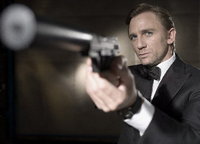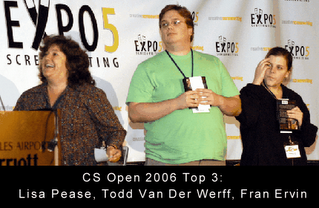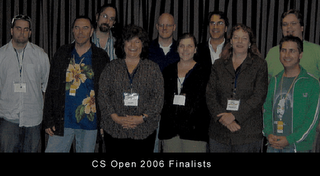Coverage, Ink has consulted on several animated feature scripts this year, and pretty much ALL of them were better than Happy Feet. Okay, while it wasn't a terrible movie by any means, neither was it very good. And its abject lameness, frankly, took me by surprise. First of all, Roeper & last week's guest critic gave it two thumbs up, and I generally find Roeper to have tastes similar to my own. Secondly, the film had a %$#^&*!%!! $42 million opening weekend, inexplicably besting the excellent Casino Royale by $2 million. Those are outrageously strong numbers, and in fact the boxoffice tally alone led me to think that this might be the film to lead feature animation--of which I am a particular fan--out of the doldrums it has been in for much of this year (due to oversaturation).

Indeed, the number of animated films that have underperformed is staggering. The Wild, The Ant Bully, Barnyard, etc., have left a bad taste in the industry's mouth. Flushed Away, which cost $150 million, was deemed such a failure it caused Dreamworks to sever their 5-picture deal with Wallace & Grommit creators Aardman after only two films, and they will likely take a massive write-down on the loss. Cars and Over the Hedge were about the only bright spots in an otherwise fairly bleak year for animation. And so I was particularly excited to see what Happy Feet brings to the table.
Unfortunately, the answer seems to be: an adorable ad campaign.
Before the movie today, I asked my 6-year-old why she wanted to see Happy Feet, yet had no interest in seeing Flushed Away, even though she had a bunch of the Flushed Away happy meal toys and knew the characters' names. She told me that Flushed Away looks yucky. It has rats and sewers and slugs. Happy Feet on the other had, has a cute little dancing penguin. Happy Feet marketing team: mission accomplished.
Here's the thing: Happy Feet just did not work, and on many levels. Firstly, story: one thing we always preach here at CI is that the protagonist needs to have a CLEAR and compelling quest. That quest forms the throughline, or spine, of the script. Look back on just about ANY great movie and you'll see that rule applies.
In Happy Feet, we have several vague storylines all competing: the protagonist Bumble is trying to A, win over an elusive, desirable girl who can sing (but he can't,) B, he wants to fit in with his group because he is different (again, he can't sing), and C, the penguins are being fished out by humans, and someone needs to figure out how to stop it. Eventually, and unsatisfyingly, C eventually becomes the dominant plot thread. This plot thread never seems like an all-important personal quest to Bumble. A and B do. The net result is the entire film has a feeling of inertia. About halfway through I turned to my wife and said, "Is it just me, or does this movie suck?" And she nodded, yep, it sucks.
Worse is that Bumble manages to somehow solve the problem in a completely illogical way. Even though it's clear he cannot communicate with the humans, the humans somehow divine that they need to stop fishing the monarch penguins' ice floe. And how does Bumble make his message clear to the humans? By coordinating the penguin flock into a massive tap dance.
WHAT THE F?
Now I have to be honest. I had actually walked out by this point. I haven't walked out of a film in years; but with 10 minutes left to go in Happy Feet, I so could not give a crap that I bailed to go look at posters in the lobby (my wife and child later filled me in on the ending.) But I mean COME ON. You know, there's a reason why, in Charlotte's Web,(which they showed the trailer for right before Happy Feet!)the animals have to figure out HOW TO COMMUNICATE with the humans to stop the threat. This should have been something organic and logical that Bumble should have had to do in order to stop the overfishing threat. But... tap-dancing?

It didn't help that the movie was not even the tiniest bit funny (but for a few yuks courtesy of ever-enthusiastic Robin Williams as pseudo-Mexican penguin Ramon) and even worse, the ad campaign turns out to be disingenous and misleading. The cute penguin is in the movie for about ten minutes. Then he grows up into not-so-cute penguin Bumble (Elijah Wood.) Had the film actually made LITTLE Bumble the protagonist, the film would likely have been much more engaging. Add in some fairly rote chases and you have two hours of time where I was sitting there thinking, jeez, I cannot believe I paid for this. Boy, am I a SUCKER.
A few weeks back I saw the underrated but very successful Over the Hedge, a very well-done animated adventure that grossed $155 million domestic box office--fantastic numbers. In that film, the hero had a clear objective; the movie was hilarious; its internal logic made perfect sense, and it had genuine heart and an arc for the hero, whereas Happy Feet has none. I think I need to rent it again to get the taste out of penguin feet out of my mouth.
Producers, if you're looking for a GOOD animated spec, we know of several. Give us a shout. And, parents, if you're looking for a film to take the kids to this weekend, well, something tells me the fine team behind Wallace & Grommitt's movie is probably far more deserving of your 10 bucks... rats and slugs notwithstanding.
--Jim Cirile








